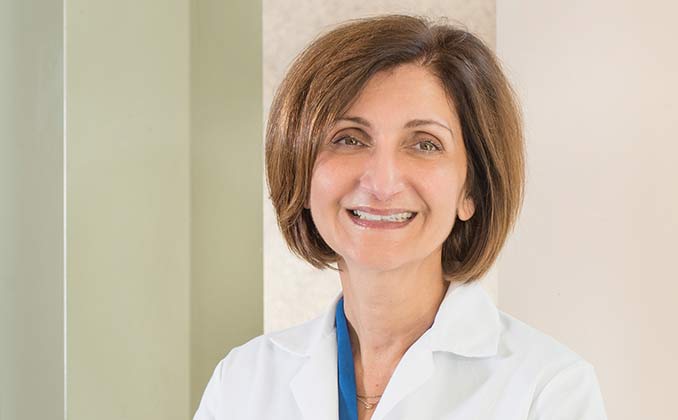Ignite | Spring 2022
Serpil Erzurum: Growing through Lean Efficiencies
This spring, just back from the opening of the Cleveland Clinic’s new hospital in London, Serpil Erzurum, M.D. (’83), confirmed that research will be part of the mix there — an expansion of the mission that the Clinic has always pursued. In the past year, this veteran of 28 years at the Clinic saw her own responsibilities grow, too.
 Beginning in 2021, Dr. Erzurum’s responsibility for the Clinic’s entire research enterprise was expanded to also encompass the institution’s work in education and innovation (the arm that takes research discoveries and moves them into practice). One new research area launched during this time was the Cleveland Clinic’s Global Center for Pathogen Research in Human Health.
Beginning in 2021, Dr. Erzurum’s responsibility for the Clinic’s entire research enterprise was expanded to also encompass the institution’s work in education and innovation (the arm that takes research discoveries and moves them into practice). One new research area launched during this time was the Cleveland Clinic’s Global Center for Pathogen Research in Human Health.
Big goals
In a Zoom call, the pulmonologist and researcher recalled that when she took the job overseeing research in 2016, she set a goal of doubling the Clinic’s research spend, then just over $200 million. “I proposed that we reach $500 million spent each year. We are at about $350 million this year and I believe in the next few years we'll achieve our goal, which is overall to support more research and innovation,” she says.
The key? Philanthropy and advocating for government funding are both important, she notes. But there’s more: “We could be more efficient. We recalculated spaces that were needed to do research. And then we recruited researchers into the spaces, which meant that we were efficiently growing research. We also reorganized departments and the administrative teams for efficiencies, particularly for grant submissions. If a researcher submits 10 grants and only one is funded, that's a waste of time. We knew we could improve infrastructure for grants writing and submissions, so that the chances of funding improve. That would save researchers time they could use for thinking of new ideas and communicating their findings to the world through publications,” she says.
Dr. Erzurum also set in place expanded information technology infrastructure to support the investigators. Pointing to the tremendous growth in big data science, she notes that huge volumes of data must be managed, and the use of data analytics needs to be optimized. She led the initiative to hire more data scientists and supported the growth of computational services — a step that has increased researchers’ capacity for computation and analysis, thus increasing their potential for productivity and high impact.
Supporting the team
Some of her leadership success may have come because she likes being on teams, says Dr. Erzurum. “I really welcome differences of opinion, and I actively look for them. I question individuals, because I want them to question me. When we're having meetings, I'll ask, ‘What are the limitations and possibilities in this approach? I enjoy hearing about the positives, but especially the negatives, because it means the process is working and somebody said something that ultimately put us on a better path.” A dog lover, she was intrigued by how seeing-eye dogs are trained. The final test is to see if the dog does not just follow commands but is actively and intentionally disobedient. If there is danger, the animal doesn’t just stop. It forcefully jerks you backward, she relates. That’s not so different from leadership: “It’s this idea that we’re all in it together. I’d better listen, because I know you mean well and you’re speaking up because it’s the right thing to do.”
Highly organized, Dr. Erzurum sets milestones to help her teams stay on track. But there’s more: “Transparency, being honest and forthright with people on the team. The team works best when they have all the knowledge at their disposal so they can understand why decisions are being made,” she says.
Growing up, there was always laughter in her household, along with “a steady drumbeat” of expectation to excel in school. (Several of her four siblings are health care professionals. Her sister,
Sergul Erzurum, M.D., graduated from NEOMED in 1988, and their late brother Victor graduated in 1995.) Today, she says, “Having a sense of humor is important in life, for the resilience to get through things. Everything is less tense and more hopeful with humor.”
A clinician first
Dr. Erzurum thinks of herself first as a clinician, with research serving as a tool to solve problems of her patients. Much of her work is with asthma, the most common chronic condition in children and a major cause of emergency room visits. She has seen tremendous progress in the last two or three decades, from improved care, she says — which is directly from research.
“Today, physicians understand the underlying causes and we have biologic therapies that can be given to severe patients to block the cause of their asthma. We even have hope for drugs that might cause remission or a cure for asthma. Back in the 1980s, that's not something I could have even dreamed of in my lifetime. It’s gratifying to have contributed even in a small way through participation in network studies across the country, through my research work with patients and through biotech-funded studies. It’s still difficult and challenging, but now I tell patients, thanks to research, we have other things we can offer you.”
